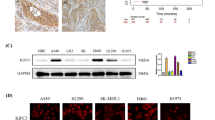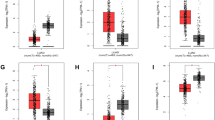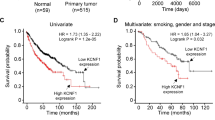Abstract
This investigation first set out to analyse which cellular proliferative and apoptotic factors, in addition to the clinical prognostic factors, are most predictive in patients with non-small-cell lung carcinomas (NSCLC). To this purpose, we related the proliferative factors proliferating cell nuclear antigen (PCNA), cyclin A, cyclin D1, cyclin-dependent kinase 2 (cdk2), cdk4 and the proportion of cell cycle phases in NSCLC to the survival times of 150 patients. Additionally, we associated the expressions of Fas, Fas ligand and caspase-3 in NSCLC to patient survival. Immunohistochemistry was used to determine the proteins and flow cytometry to assess the proportion of cell cycle phases. Patients with PCNA-positive carcinomas had significantly shorter survival times than patients with PCNA-negative carcinomas (median survival times: 51 vs 89 weeks). Corresponding results were obtained with the factor cyclin A (64 vs 92 weeks), with the factor cdk2 (76 vs 89 weeks), with the factor cdk4 (62 vs 102 weeks) and with the proportion of S phases (86 vs 121 weeks). Patients with an expression of the apoptotic factors had a more favourable prognosis than patients with negative carcinomas. The median survival times of cancer patients with Fas expression was 86 weeks and of those without Fas expression only 69 weeks. Corresponding results were obtained with the Fas ligand (87 vs 41 weeks) and caspase 3 (87 vs 34 weeks). In order to determine whether a combination of factors can yield improved prognostic information, we investigated all possible combinations of the proliferative and apoptotic factors. Patients with tumours having a high proliferative activity, but which did not express apoptotic factors had the shortest survival times while patients with a low proliferative activity and a high expression of apoptotic factors had the most favourable outcome. A multivariate analysis (Cox model) of the cellular and clinical prognostic factors indicated that stage, lymph node involvement, Fas, PCNA and cyclin A are the most important prognostic factors for the clinical outcome of patients with non-small-cell lung carcinomas. © 2000 Cancer Research Campaign
Similar content being viewed by others
Article PDF
Change history
16 November 2011
This paper was modified 12 months after initial publication to switch to Creative Commons licence terms, as noted at publication
References
Cardon-Cardo C (1995) Mutation of cell cycle regulators. Biological and clinical implications for human neoplasia (review). Am J Pathol 147: 545–560
Ebina M, Steinberg SM, Mulshine JL and Linnoila RI (1994) Relationship of p53 overexpression and up-regulation of proliferating cell nuclear antigen with the clinical course of non-small-cell lung cancer. Cancer Res 54: 2496–2503
Fernandez-Alnemri T, Litwack G and Alnemri ES (1994) CPP32, a novel human apoptotic protein with homology to Caenorhabditis elegans cell death Ced-3 and mammalian interleukin-1β-converting enzyme. J Biol Chem 269: 30761–30764
Fisher DE (1994) Apoptosis in cancer therapy: crossing the threshold. Cell 78: 539–542
Garcia RL, Coltera MD and Gown AM (1989) Analysis of proliferative grade using anti-PCNA/cyclin monoclonal antibodies in fixed, embedded tissues. Am J Pathol 134: 733–773
Haag D (1980) Flow microfluorometric deoxyribonucleic acid (DNA) analysis supplementing routine histopathologic diagnosis of biopsy specimens. Lab Invest 42: 85–90
Hall PA and Levison DA (1990) Review: assessment of cell proliferation in histological material. J Clin Pathol 43: 184–192
Hellquist HB, Alejnick B, Jadner M, Andersson T and Sederholm C (1997) Fas receptor is expressed in human lung squamous cell carcinomas whereas bcl-2 and apoptosis are not pronounced. A preliminary report. Br J Cancer 76: 175–179
Jaskulski D, De Riel JK, Mercer WE, Calabretta B and Baserga R (1988) Inhibition of cellular proliferation by antisense oligodeoxynucleotides to PCNA/cyclin. Science 240: 1544–1546
Kangas A, Nicholson DW and Hölttä E (1998) Involvement of CPP32/caspase-3 in c-Myc-induced apoptosis. Oncogene 16: 387–398
Keyomarsi K and Pardee AB (1997) Redundant cyclin over-expression and gene amplification in breast cancer cells. Proc Natl Acad Sci USA 90: 1112–1116
Koomägi R and Volm M (1999) Expression of Fas (CD95/Apo-1) and Fas ligand in lung cancer, its prognostic and predictive relevance. Int J Cancer (Pred Oncol) 84: 239–243
Lew DJ and Kornbluth S (1996) Regulatory roles of cyclin-dependent kinase phosphorylation in cell cycle control. Curr Opin Cell Biol 8: 795–804
Michalides R, Van Veelen N, Hart A, Loftus B, Wientjens E and Balm A (1995) Overexpression of cyclin D1 correlates with recurrence in a group of forty-seven operable squamous-cell carcinomas of the head and neck. Cancer Res 55: 975–978
Nagata S and Golstein P (1995) The Fas death factor. Science 267: 1451–1455
Naitoh H, Shibata J, Kawaguchi A, Kodama M and Hattori T (1995) Overexpression and localization of cyclin D1 RNA and antigen in esophageal cancer. Am J Pathol 146: 1161–1169
Nicholson DW, Ali A, Thornberry NA, Vaillancourt JP, Ding CK, Gallant M, Gareau Y, Griffin PR, Labelle M and Lazebnik YA (1995) Identification and inhibition of the ICE/CED-3 protease necessary for mammalian apoptosis. Nature 376: 37–43
Niehans GA, Brunner T, Frizelle SP, Liston JC, Salerno CT, Knapp DJ, Green DR and Kratzke RA (1997) Human lung carcinomas express Fas ligand. Cancer Res 57: 1007–1012
Paterlini P, Flejou JF, DeMitri MS, Pisi E, Franco D and Brechot C (1995) Structure and expression of the cyclin A gene in human primary liver cancer. Correlation with flow cytometry parameters. J Hepatol 23: 47–52
Seshadri R, Lee CSL, Hui R, McCaul K, Horsfall DJ and Sutherland RL (1996) Cyclin D-1 amplification is not associated with reduced overall survival in primary breast cancer, but may predict early relapse in patients with features of good prognosis. Clin Cancer Res 2: 1177–1184
Tam SW, Theodoras AM, Shay JW, Draetta GF and Pagano M (1994) Differential expression and regulation of cyclin-D1 protein in normal and tumor human cells: association with cdk4 is required for cyclin-D1 function in G1 progression. Oncogene 9: 2663–2674
Volm M, Mattern J and Samsel B (1993) Relationship of inherent resistance to doxorubicin, proliferative activity and expression of P-glycoprotein and glutathione S-transferase-π in human lung cancer. Cancer 71: 3181–3187
Volm M, Stammler G, Koomägi R and Mattern J (1996) Co-expression of cyclin D1 and retinoblastoma gene product (pRb) in human squamous cell lung carcinomas is associated with increased tumor take rate in nude mice. Int J Oncol 9: 1253–1257
Volm M, Koomägi R, Mattern J and Stammler G (1997 a) Cyclin A is associated with an unfavourable outcome in patients with non-small-cell lung carcinomas. Br J Cancer 75: 1174–1778
Volm M, Mattern J, Stammler G, Royer-Pokora B, Schneider S, Weirich A and Ludwig R (1997 b) Expression of resistance related proteins in nephroblastoma after chemotherapy. Int J Cancer 63: 193–197
Xerri L, Devilard E, Hassoun J, Mawa SC and Birg F (1997) Fas ligand is not only expressed in immune privileged human organs but is also coexpressed with Fas in various epithelial tissues. J Clin Pathol Mol Path 50: 87–91
Zindy F, Lamas E, Chenivesse X, Sobczak I, Wang I, Fesquet D, Henglein B and Brechot C (1992) Cyclin A is required in S-phase in normal epithelial cells. Biochem Biophys Res Commun 182: 1144–1151
Author information
Authors and Affiliations
Rights and permissions
From twelve months after its original publication, this work is licensed under the Creative Commons Attribution-NonCommercial-Share Alike 3.0 Unported License. To view a copy of this license, visit http://creativecommons.org/licenses/by-nc-sa/3.0/
About this article
Cite this article
Volm, M., Koomägi, R. Relevance of proliferative and pro-apoptotic factors in non-small-cell lung cancer for patient survival. Br J Cancer 82, 1747–1754 (2000). https://doi.org/10.1054/bjoc.1999.1210
Received:
Revised:
Accepted:
Published:
Issue date:
DOI: https://doi.org/10.1054/bjoc.1999.1210
Keywords
This article is cited by
-
Identification of HLA ligands and T-cell epitopes for immunotherapy of lung cancer
Cancer Immunology, Immunotherapy (2013)
-
Intratumoral CRH modulates immuno-escape of ovarian cancer cells through FasL regulation
British Journal of Cancer (2007)
-
Prognostic value of cyclin D1 overexpression in correlation with pRb and p53 status in non-small cell lung cancer (NSCLC)
Journal of Cancer Research and Clinical Oncology (2005)
-
pRB2/p130 target genes in non-small lung cancer cells identified by microarray analysis
Oncogene (2003)
-
Differentially expressed genes associated with mouse lung tumor progression
Oncogene (2002)



